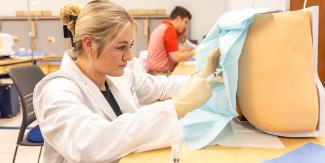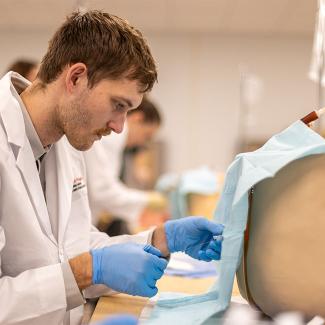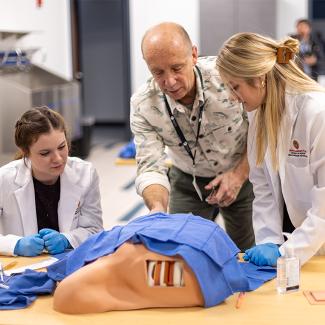Make a Difference as a Physician Assistant
As vital members of the healthcare team, physician assistants (PAs) play a critical role in patient care across various specialties, including primary care, internal medicine, emergency medicine, pediatrics, geriatrics, and orthopedics. Physician assistants are licensed to perform a range of essential tasks, such as conducting exams, diagnosing and treating illnesses, prescribing medications, and assisting in surgeries, PA's bridge gaps in healthcare access and provide quality care in numerous settings.
With demand for qualified PAs on the rise, this career offers a bright outlook and a rewarding, respected path in healthcare. As the medical landscape evolves, PAs are uniquely positioned to meet the growing need for skilled providers who make a lasting impact on patient well-being and healthcare improvement. Explore how the Physician Assistant Master’s Degree at UW-Platteville can prepare you for success.
What you'll learn in the program
Our innovative wisPACT@UW-Platteville program is a smart investment in your future. In partnership with the University of Wisconsin-Madison, you’ll complete rural-focused clinical experiences and rotations, earning a Master of Physician Assistant Studies from UW-Madison—all while completing your coursework at UW-Platteville. This program equips graduates to deliver high-quality healthcare to individuals and families in rural communities.
We offer two pathways to achieve your goals:
- Accelerated Program Track: Complete your bachelor’s and master’s degrees in just five years, saving time and money.
- Traditional Program Track: Follow a conventional timeline to earn your degree.
Both tracks ensure a seamless transition to graduate school, affordable tuition, and personalized support from UW-Platteville and UW-Madison faculty committed to your success.
Careers in rural healthcare
Looking for a meaningful career that makes a difference? Our PA programs prepare you to address critical healthcare needs, particularly in rural communities.
While 14% of Americans live in rural areas, these regions account for nearly two-thirds of the country’s primary healthcare shortages. Wisconsin and the tri-state region (Wisconsin, Iowa, Illinois) are among the hardest hit. Our collaborative master’s program equips you with the skills and knowledge to close these gaps and provide essential care where it’s needed most.
Differing from nurse practitioners, physician assistants are trained under the medical model of education, providing them with versatile skills applicable across various specialties. This unique training model enables PAs to deliver essential care and make an impact in various settings—from primary care to emergency medicine—especially in underserved areas.

Path 1: Accelerated 3+2 Program
Save time and money with the accelerated 3+2 track. Complete three years of Bachelor of Science in Biology coursework, followed by two years of Master of Science in Physician Assistant Studies coursework. Earn BOTH degrees in five years, all coursework taken at UW-Platteville. No GRE required.
Eligibility Requirements:
- Apply to the 3+2 program in your sophomore year.
- Declare a BS in Biology with Health Science Emphasis.
- Complete 90 credits and specific PA program prerequisites by the start of the PA program.
- Earn a “B” or better in PA education program prerequisites.
- Complete 500 hours of direct patient care experience.
- Achieve certification as a Certified Nursing Assistant or Emergency Medical Technician the summer before or after your first year.
- Participate in healthcare enrichment activities and seminars that can include Wisconsin Area Health Education Center Activities, such as Wisconsin Express, Community Health Internship Program Internships, and AHEC Scholars.
- Participate in Preparing Undergraduate Medical Professionals Seminar.
Path 2: Traditional Program Track
Choose the traditional route by earning a bachelor’s degree in any field and meeting the admission requirements to apply for the Master of Physician Assistant Studies (MPAS) program. All coursework will be completed at UW-Platteville, and no GRE is required. Preference throughout the admissions process is given to Wisconsin residents and mission-aligned applicants.
Application Requirements:
- Submit a Centralized Application Service (CASPA) in the summer after your third year.
- Provide one letter of recommendation from the Pre-Health Advising Team.
- Complete an interview at UW-Platteville
- Attend the required PA program orientation at both the UW-Platteville and UW-Madison campuses after program acceptance.
About the collaboration
UW-Platteville is committed to training knowledgeable, skilled, professional, and compassionate physician assistants to meet the healthcare needs of Wisconsin and beyond through distinction in education, research, patient care, and service, while significantly contributing to and advancing the physician assistant profession.
The UW-Madison Physician Assistant Program has a strong legacy of recruiting students from rural, urban, and underserved communities, preparing them for primary care or specialty practice in those areas. We are proud to partner with one of the state’s leading physician assistant programs at UW-Madison to provide exceptional opportunities for our students at UW-Platteville.
Program structure
We anticipate accepting 10 students into the program in Year 1 (May 2023); 12 students in Year 2 (May 2024); and 14 students in Year 3 (May 2025). The following outlines the structure of the MPAS program in Year 1 and Year 2.
Year 1: Didactic Coursework
Students complete one year of coursework, delivered primarily through videoconferencing. Classes are taught by faculty from both UW-Madison and UW-Platteville. Key components of the first year include:
- Gross Anatomy and Human Dissection
- History and Physical Exams
- Clinical Labs and Workshops
These hands-on sessions are led by faculty, ensuring a strong foundation in essential medical knowledge and skills.
Year 2: Clinical Rotations
The second year focuses on clinical rotations, primarily in southwestern Wisconsin, emphasizing rural and underserved communities. Rotations, lasting 4–8 weeks each, include:
- Family Medicine: Prenatal, gynecological, pediatric, and behavioral health care
- Internal Medicine: General and subspecialties in both clinic and hospital settings
- Surgery: General and subspecialties
- Emergency Medicine: Emergency and urgent care in hospital settings
- Electives: Opportunities in various specialties

Discover By Doing
The Master of Science in Physician Assistant program at UW-Platteville offers a student-centered approach. Focused on experiential learning that connects your education to your future career, you will prepare to provide high quality healthcare to rural communities.

UW-Platteville, 2012; UW-Madison PA program, 2015
I’m very excited to hear about the partnership between UW-Platteville and UW-Madison PA program. Platteville was a fantastic place to start my education. The smaller class sizes at UW-Platteville made my learning experience much more personal. I felt very prepared to take on PA school.

UW-Platteville, 2014; UW-Madison, 2018
I had a great educational and personal experience at UW-Platteville. The variety of classes really helped shape my 'big picture' perspective of the world. PA school seemed to be more of an extension of my UW-Platteville education, versus a next step. The rural nature of UW-Platteville allowed me to enjoy outdoor activities as I always have.

-
wisPACT@UW-Platteville: Sample 3+2 Degree Plan
BS in Biology (Health Sciences Emphasis) and Master of Physician Assistant Studies (MPAS)
FALL I (15-16 credits) SPRING I (15 credits) FALL II (16 credits) SPRING II (16 credits) FALL III (14 credits) SPRING III (16 credits) BIO 1650* - The Unity of Life (5cr) BIO 1750 - The Diversity of Life (5cr) BIO 1020 - BioQuest (1cr) CHEM 1140* - General Chemistry I (4cr) MATH 1830 - Elementary Statistics (3cr) ENG 1230 - College Writing II (3cr) ENG 1130 - College Writing I (3cr) PSYCH 1130* - General Psychology (3cr) SPEECH - 2 or 3cr HHP 1000 - Fitness Assessment (1cr) BIO 2420 - Fundamentals of Bio Investigations (3cr) BIO 2240* - Human Anatomy & Physiology II (5cr) BIO 2140* - Human Anatomy & Physiology I (5cr) CHEM 3540/3510* - Organic Chemistry w/ lab (4+1cr) CHEM 1240* - General Chemistry II (4cr) BIO 3450 - Ecology and Evolution (3cr) HUMANITIES - 3cr SOCIAL SCIENCES - 3cr HHP - Health & Human Performance Activity (1cr) FINE ARTS - (3cr) BIO 3240* - Microbiology (5cr) CHEM 4630*/4610 - Biochemistry (3+1cr) BIO 4990 - Capstone Course: The Study of Life (1cr) BIO 4440 - Human Gross Anatomy (4cr) HISTORY/INTERNATIONAL - 3cr ETHNIC AND GENDER STUDIES - 3cr BIO 3330 - Genetics (3cr) BIO 2040 - Cell Biology (4cr) *PA Program prerequisites
UW-Platteville students will take the following courses in the UW-Madison MPAS Program during their senior or fourth year of college study:
Semester One (Summer) - 15 cr.
- Anatomy 629 Human Anatomy Laboratory for Physician Assistants: 7 cr.
- PA 550 Fundamentals of Clinical Medicine: 3 cr.
- PA 616 Professional Seminar I: 1 cr.
- PA 619 History and Physical Examination for Physician Assistants: 4 cr.
Semester Two (Fall) - 18 cr.
- Medical Microbiology 704 Infectious Diseases of Human Beings: 3 cr.
- PA 601 Clinical Medicine for Physician Assistants I: 5 cr.
- PA 610 Clinical Prevention and Community Practice I: 1 cr.
- PA 617 Professional Seminar II: 1 cr.
- PA 620 Advanced Patient Evaluation in the Primary Care Setting I: 1 cr.
- PA 630 Women’s Health: 3 cr.
- PA 640 Clinical Pharmacology I: 2 cr.
- PA 650 Diagnostic Methods I: ECG, Laboratory

Program costs
For detailed information on tuition and fees for the wisPACT@UW-Platteville program, please visit our Tuition and Fees page. We provide transparent, competitive pricing to help you plan your educational investment with confidence.

Accredited by ARC-PA
Our Physician Assistant program is accredited by the Accreditation Review Commission on Education for the Physician Assistant. UW-Platteville’s distant campus, established in partnership with UW-Madison, welcomed its first cohort in May 2023, offering you a cutting-edge education in a growing field.

Contact us
Have questions about the UW-Platteville program? Reach out to biology@uwplatt.edu.
For information on the UW-Madison Physician Assistant program, contact Emma Hinker, Academic Advisor, at ehinker@wisc.edu.
The development of this distant campus is supported by the Health Resources and Services Administration of the U.S. Department of Health and Human Services as part of an award totaling $259,363 with 0% financed with non-governmental sources. The contents are those of the author(s) and do not necessarily represent the official views of, nor an endorsement, by HRSA, HHS, or the U.S. Government.

